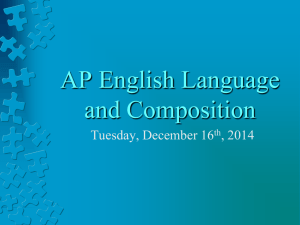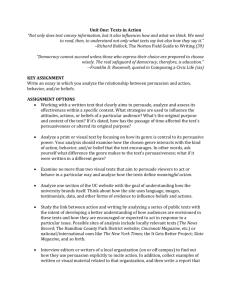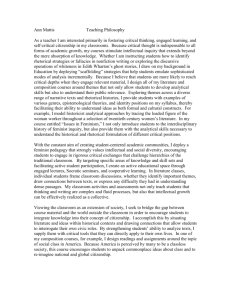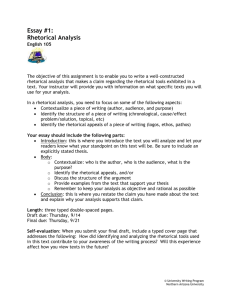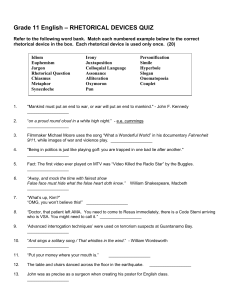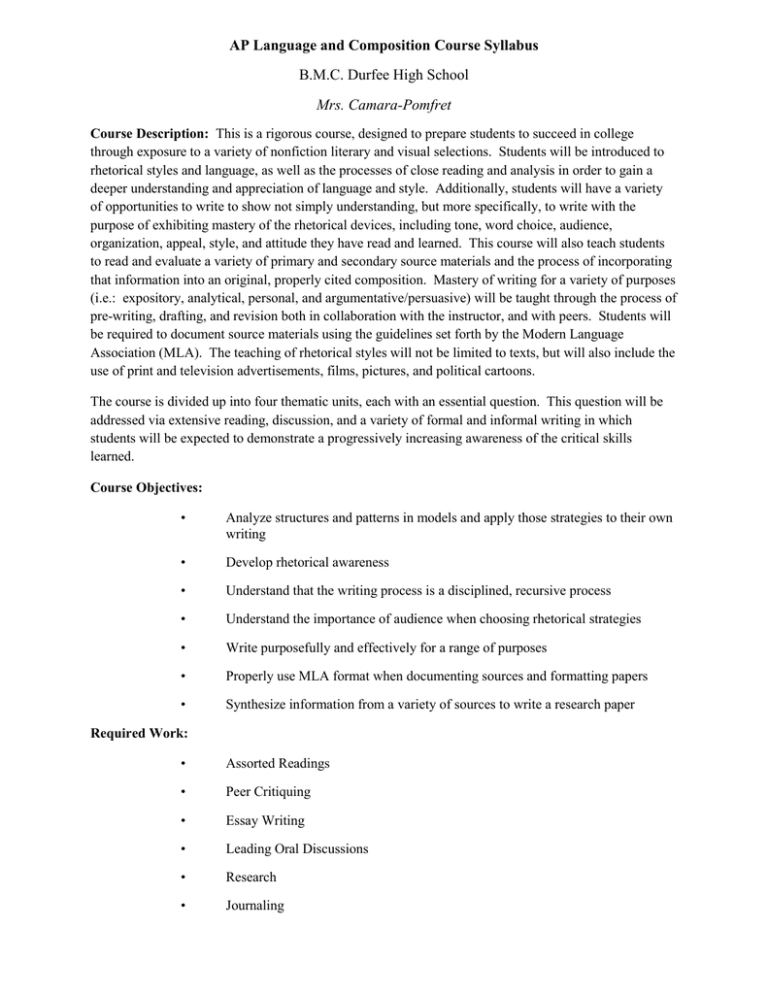
AP Language and Composition Course Syllabus
B.M.C. Durfee High School
Mrs. Camara-Pomfret
Course Description: This is a rigorous course, designed to prepare students to succeed in college
through exposure to a variety of nonfiction literary and visual selections. Students will be introduced to
rhetorical styles and language, as well as the processes of close reading and analysis in order to gain a
deeper understanding and appreciation of language and style. Additionally, students will have a variety
of opportunities to write to show not simply understanding, but more specifically, to write with the
purpose of exhibiting mastery of the rhetorical devices, including tone, word choice, audience,
organization, appeal, style, and attitude they have read and learned. This course will also teach students
to read and evaluate a variety of primary and secondary source materials and the process of incorporating
that information into an original, properly cited composition. Mastery of writing for a variety of purposes
(i.e.: expository, analytical, personal, and argumentative/persuasive) will be taught through the process of
pre-writing, drafting, and revision both in collaboration with the instructor, and with peers. Students will
be required to document source materials using the guidelines set forth by the Modern Language
Association (MLA). The teaching of rhetorical styles will not be limited to texts, but will also include the
use of print and television advertisements, films, pictures, and political cartoons.
The course is divided up into four thematic units, each with an essential question. This question will be
addressed via extensive reading, discussion, and a variety of formal and informal writing in which
students will be expected to demonstrate a progressively increasing awareness of the critical skills
learned.
Course Objectives:
•
Analyze structures and patterns in models and apply those strategies to their own
writing
•
Develop rhetorical awareness
•
Understand that the writing process is a disciplined, recursive process
•
Understand the importance of audience when choosing rhetorical strategies
•
Write purposefully and effectively for a range of purposes
•
Properly use MLA format when documenting sources and formatting papers
•
Synthesize information from a variety of sources to write a research paper
Required Work:
•
Assorted Readings
•
Peer Critiquing
•
Essay Writing
•
Leading Oral Discussions
•
Research
•
Journaling
Course Outline:
Texts: The majority of short readings will be taken from the following texts:
Gong, Gwendolyn, Sam Draga. A Writer’s Repertoire. Longman/Addison Wesley Longman, Inc. 1995.
Greenblatt, Stephen, M.H. Abrams, Jon Stallworthy, Jahan Ramazani. The Norton Anthology of English
Literature: 8th Edition, Volume F. New York: W.W. Norton & Co. 2006.
Lunsford, Andrea A., John J. Ruszkiewicz, and Keith Walters. Everything’s an Argument. Boston:
Bedford/St. Martin’s 2010.
Meyer, Michael. The Bedford Introduction to Literature, 2nd Edition. Boston: Bedford Books of St.
Martin’s Press. 1990.
Miller, George. The Prentice Hall Reader. Comp. Darlene Stock Stotler and Heather Winterbottom. Ninth
Edition. Upper Saddle River: Prentice Hall, 2010.
Roskelly, Hephzibah, and David A. Jolliffe. Everyday Use: Rhetoric at Work in Rhetoric at Work in
Reading and Writing. Second Edition. New York: Pearson/Longman, 2009.
Shea, Renee H., Lawrence Scanlon, Robin Dissin Afses. The Language of Composition. Boston:
Bedford/St. Martin’s. 2008.
Visual texts and writings will be taken from the above readers, as well as current periodicals such as
Time, Newsweek, The Atlantic Monthly, National Geographic, Sports Illustrated, Harpers, The New
Yorker, The Nation, and The Economist, the Internet, and other media sources and newspapers.
Instruction:
Instruction will follow a cooperative workshop model. Students will be organized into small and large
groups in order to develop rhetorical problem-solving skills essential to creating college-level, audiencecentered writing for a variety of purposes, audiences, and rhetorical situations. Students will be expected
to participate in both small- and large-group discussions regarding work covered both in and out of class.
The instructor will deliver student-centered, media-enhanced, mini-lectures on the reading strategies, the
writing process, composition strategies, modes of discourse, and research methods. Class writing will
include pre-writing techniques, revision strategies, editing, source documentation, editing, and peercritiquing. As writing is a recursive process, students will be allowed and expected to submit multiple
revisions of the same paper as they work through their understanding of the writing process and the
strategies and structures of various types of discourse. Journaling will be required as students attempt to
have conversations with texts and make connections.
Ongoing Assignments and Strategies:
In preparation for the AP examination, students will be required to use the following periodicals as
supplementary materials: Time, Newsweek, The Atlantic Monthly, National Geographic, Sports
Illustrated, Harpers, The New Yorker, The Nation, and The Economist. On a monthly basis, students
will prepare and present one article that will include citations, annotations, and a brief analysis. These
will be presented on the last school day of each month.
The AP Exam
The AP English Language and Composition Exam provides students the opportunity to demonstrate their
mastery of the aforementioned skills and objectives. The exam will be administered in Spring 2012. The
exam is a 3 hour and 15 minute exam consisting of two major sections: Multiple-choice Questions and
Free.
In-Class Timed Writing
In-class timed writing will be assigned on a regular basis. Prompts will include previous AP
exam prompts, as well as responses to class readings and local, national and global news. These
timed sessions will equip students with the confidence to successfully attack the writing prompts
on the AP exam.
Current Events Journal
Students will be asked to maintain one Current Events Journal per quarter. Each quarter, students
will self-select one controversial issue in the news. Students should take the opportunity to select a
topic that is of interest to them and provides an adequate amount of research material.
Grading Policy:
Quarterlies
15%
Homework/Preparedness/Participation
25%
Assessments
60%
•Exams/Essays/Projects & Presentations/Unit Tests (40%)
•Quizzes (20%)
Course Outline:
Term 1: Course introduction, introduction to rhetoric, introduction to close reading – analysis,
synthesizing sources in writing
Focus Theme: Education - To what extent do our schools serve the goals of a true education?
Minor Paper #1: Students will analyze a political cartoon in terms of the rhetorical triangle and its appeal
to logos, pathos, and ethos.
Minor Paper #2: Students will read four texts related to the death of Diana, Princess of Wales. Students
will determine how effective each text is in achieving its intended purpose and explain why.
Minor Paper #3: Students will find an ad that either appeals to them or provokes them and analyze it.
Major Paper #1: Education – To what extent do our schools serve the goals of a true education?
Students will evaluate the question from a variety of viewpoints in order to compose an argument paper.
Sample Texts: I Know Why the Caged Bird Cannot Read by Francine Prose, Education by Ralph Waldo
Emerson, Superman and Me by Sherman Alexie, Best in Class by Margaret Talbot, A Talk to Teachers by
James Baldwin, School by Kyoko Mori, The History Teacher by Billy Collins, Eleven, Sandra Cisneros
Term 2: Rhetorical analysis, understanding rhetorical strategies, grammar as rhetoric and style
Focus Theme: Politics – What is the nature of the relationship between the citizen and the state?
Major Paper #2: Students will choose two essays and write a compare/contrast essay focusing on how
each writer uses language to achieve his or her purpose.
Major Paper #3: Students will research and collect newspaper articles relating to election speeches.
SampleTexts: On Seeing England for the First Time by Jamaica Kincaid, A Modest Proposal by Jonathan
Swift, The Destruction of Culture by Chris Hedges, National Prejudices by Oliver Goldsmith, Thoughts
on Peace in an Air Raid by Virginia Woolfe, On the Duty of Civil Disobedience by Henry David
Thoreau, Every Dictator’s Nightmare by Wole Soyinka, On the Rainy River by Tim O’Brien,
Conversation with an American Writer by Yevegeny Yevtushenko, visual texts from Picasso, The New
Yorker, and Harper’s. Additional texts may include: Shooting an Elephant by George Orwell, The
Empire Fights Back by Chinua Achebe, In Which the Ancient History I Learn Is Not My Own by Eavan
Boland
Term 3: Synthesizing, rhetorical analysis, cause and effect, style, argument
Focus Theme: Gender and Stereotypes – What is the impact of the gender roles that society creates and
enforces?
Major Paper #4: Students, using the documents they have read, as well as their own knowledge and
research, will write an argument defining what they see as the central issue facing boys and young men in
our society.
Major Paper #5: Students will choose one or two assertions that authors in the texts that they have read
on gender make that they believe are questionable or even cases of stereotyping. They will then write an
essay exploring how popular culture and the media promote or reinforce such beliefs.
SampleTexts: Women’s Brains by Stephen Jay Gould, Professions for Women by Virginia Woolfe,
Letter from John and Abigail Adams, About Men by Gretel Ehrlich, The Myth of the Latin Woman: I
Just Met a Girl Named Maria by Judith Ortiz Cofer, Being a Man by Paul Theroux, AIDS Has a
Woman’s Face by Stephen Lewis, There Is No Unmarked Woman by Deborah Tannen, Sweat by Zora
Neale Hurston, Barbie Doll by Marge Piercy, Why Johnny Won’t Read by Mark Bauerlein and Sandra
Stotsky, Mind Over Muscle by David Brooks, Putting Down the Gun by Rebecca Walker, Boy Problems
by Ann Hulbert,
Term 4: Formal research paper, exam preparation, AP exam
Focus Theme: Community – What is the relationship of the individual to the community?
Research Paper: Students will begin by analyzing published research papers in various fields. This will
be followed by a discussion of topic selection, the research question, research methods, evaluation of
resources, integrating sources and documentation systems. Students will choose a topic of interest that
has not been covered in class and then develop a research question. This paper relies heavily on
independent, outside research as the student becomes knowledgeable about the data and arguments
concerning their topic. Students will participate in peer coaching and meet with the instructor regularly
(at least once a week) throughout the process. This will be a recursive process and require several drafts
before the final paper is submitted and accepted.
Sample Texts: Letter from Birmingham Jail by Martin Luther King Jr., Where I Lived, and What I Lived
for by Henry David Thoreau, All Happy Clans Are Alike: In Search of the Good Family by Jane
Howard, The New Community by Amitai Etzioni, Commencement Speech at Mount Holyoke by Anna
Quindlen, Walking the Path Between Worlds by Lori Arviso Alvord, New York Day Women by Edwidge
Danticat, The Happy Life by Bertrand Russell, The Singer Solution to World Poverty by Peter Singer,
Lifeboat Ethics: The Case Against Helping the Poor by Garrett Hardin, In Westminster Abbey by John
Betejeman


